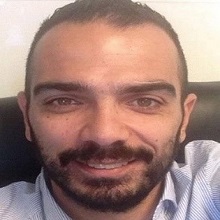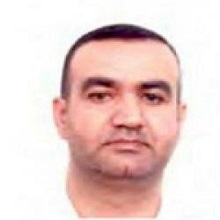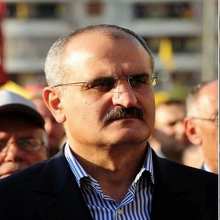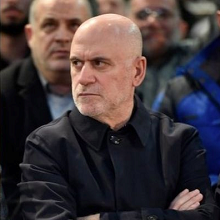Salim Ayyash is a Lebanese Hezbollah agent accused of leading the assassination team that bombed the convoy of former Lebanese Prime Minister Rafik Hariri in Beirut on February 14, 2005. In addition to Hariri, the explosion killed 21 others and wounded 226. In August 2020, the U.N.-backed Special Tribunal for Lebanon convicted Ayyash in absentia of leading the assassination team.
At approximately 12:49 p.m. on February 14, 2005, Hariri and Lebanese parliamentarian Bassel Fuleihan entered Hariri’s armored vehicle in Beirut to attend a lunch appointment. At 12:55 p.m., a suicide bomber exploded a van outside the St. Georges Hotel as Hariri’s vehicle approached. Suspicion quickly fell upon Syrian and Hezbollah forces. At the time of the explosion, Syria maintained its occupation of Lebanon and Hariri led a vocal opposition to the Syrian regime in the Lebanese parliament. Hariri also sought Hezbollah’s eventual disarmament.
In March 2005, a Swiss forensics team arrived in Beirut to begin an investigation into the explosion. They were later joined by Dutch, Spanish, Lebanese, and British investigators. The U.N. secretary-general also sent a fact-finding mission that month. That mission recommended the creation of an independent international investigation. On December 13, 2005, the Lebanese government requested the United Nations create a tribunal to investigate and try those responsible for the attack. On May 30, 2007, the U.N. Security Council passed Resolution 1757 to create the Special Tribunal for Lebanon (STL) to investigate the 2005 bombing. The STL began its investigation on March 1, 2009, from The Hague, Netherlands. It was the first international tribunal to address an act of terrorism as a distinct crime.
On June 30, 2011, the STL indicted Ayyash for the 2005 explosion. The court also indicted Hassan Anaissy, Assad Sabra, and Mustafa Badreddine. Of the four, Ayyash and Badreddine were linked to Hezbollah. Ayyash was also related to Baddredine through marriage. Ayyash was charged with conspiracy aimed at committing a terrorist act; committing a terrorist act by means of an explosive device; intentional homicide with premeditation by using explosive materials in association with the death of Hariri; intentional homicide with premeditation by using explosive materials in association with the death of 21 others; and attempted intentional homicide of 226 others. On February 1, 2012, the STL ruled that Ayyash and his co-defendants would be tried in absentia. In October 2013, the STL filed charges against suspected Hezbollah member Hassan Habib Merhi and subsequently added him in absentia to the trial of Anaissy, Sabra, and Ayyash.
The STL publicly called on the defendants to appear in their own defense. None of them did. On January 16, 2014, the STL began a trial in absentia of Ayyash and his alleged co-conspirators in relation to the 2005 attack that killed Hariri. STL prosecutors argued Ayyash and his co-conspirators used five mobile phone networks to coordinate and execute the attack. Prosecutors presented evidence specifically linking Ayyash to those networks. Prosecutors also accused Ayyash of purchasing the van the attackers filled with explosives and aiding the preparation of a false claim of responsibility following the attack.
The STL’s charter gives it authority to investigate other attacks in relation to the February 14, 2005, bombing. On October 1, 2004, an explosive device in Beirut wounded Lebanese politician Marwan Hamade and one other and killed Hamade’s bodyguard. On June 21, 2005, an explosion in Beirut killed Lebanese politician Georges Hawi and wounded two others. On July 12, 2005, an explosion in Beirut killed one and wounded Lebanese politician Elias El-Murr and 14 others. In 2019, the STL launched a second investigation into Ayyash’s involvement in those attacks. That trial commenced on February 5, 2020.
On August 18, 2020, the STL found Ayyash guilty of all charges in the Hariri case while clearing Anaissy, Sabra, and Merhi. The STL found that Ayyash led the assassination team responsible for the explosion. According to the tribunal, Ayyash conspired with Badreddine but the tribunal did not conclude Badreddine’s specific role in the plot. Baddredine died in May 2016 explosion in Syria, which Hezbollah initially blamed on Israel and then on Sunni jihadists. The STL chose not to pursue the criminal case against Badreddine after his death. The court did not find direct evidence that the Syrian regime or Hezbollah’s leadership played a role in the bombing, but the STL acknowledged both had a motive to eliminate Hariri.
Ayyash grew up in southern Lebanon and served as a firefighter in the country’s Civil Defense. According to U.S., European, and Middle Eastern former security officials, Ayyash belonged to a Hezbollah assassination team called Unit 121, which is controlled by Hezbollah’s top leadership. Ayyash allegedly commanded the unit while Badreddine directly authorized Hariri’s assassination, according to the former officials. Hezbollah has denied involvement in the bombing. Ayyash’s family in Lebanon has denied his involvement and argued that he was in Saudi Arabia at the time of the attack. Ayyash remains at large. If he is captured, he will have to be retried.






